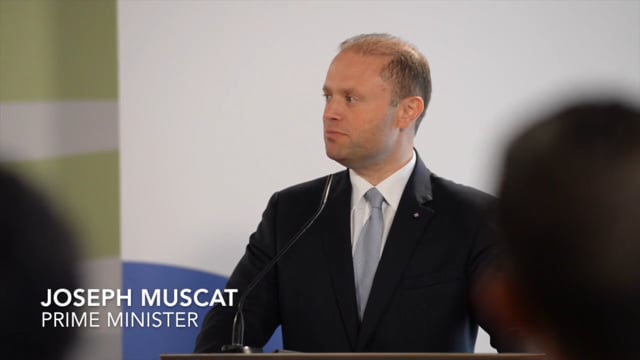[WATCH] Letter of intent paves way for €320 million Malta-Sicily gas pipeline
OPM minister Konrad Mizzi appears by Prime Minister Joseph Muscat’s side for the signing of ‘a significant milestone’ for Malta


The government has signed a letter of intent with Sicilian authorities that will “make it easier to draft a way forward” for the construction of a gas pipeline, which is expected to cost €320 million, and which will take approximately seven years to complete.
With OPM Minister Konrad Mizzi standing by his side, Prime Minister Joseph Muscat said the signing represented a significant milestone that would help develop the country’s infrastructure.
No questions were taken, as the two rushed out of the press conference as soon as the signing was over.
“Today’s milestone draws lessons from the experience we have had over past four years with the way in which interconnector project was approached,” Muscat said.
“It was conceived by the previous administration but no permits and no system was in place.”
The Prime Minister said that the government had invested a significant amount of energy to ensure that Malta was on the same page as Sicilian authorities in order to make the project a reality.
He said that through the agreement signed today, work on the project can go on with considerably less bureaucracy and waste of time.
“It will mean both sides know what time frames are expected of them,” he added.
The Prime Minister thanked Sicilian authorities for making themselves available to sign the agreement and expressed his satisfaction at the fact that the pipeline would allow the country to “transition from the LNG tanker to a more permanent structure”.
Muscat added that both the cost and timeframe involved for the project to be completed were realistic and achievable.
Minister Konrad Mizzi explained that the agreement would pave the way for the Sicilian province and the Italian government to support the Maltese government in applying for permits in Sicily.
He said that plans for a pipeline were aligned with the European Union’s plans for increased energy connectivity, and would reduce Malta’s isolation in terms of energy.
Mizzi said that in 2013, the EU had introduced new rules on the financing of similar projects, setting up the ‘Projects of common interest’ framework.
He added that the project made sense for both Italy and Malta and that countries involved in projects of common interest were obliged to reduce bureaucracy and to facilitate processes associated with the project.
According to Mizzi, following the approval of the project as one of common interest in October 2013, bilateral talks with the Italian ministry and department of energy took place in February 2015.
In April 2015, feasibility studies were started and a rough route for the pipeline and the stages the project would have to go through were drawn up.
In November 2015, said Mizzi, the European Commission confirmed the project as one of common interest and a Belgian company was engaged to carry out preparatory studies for the route and to draw up engineering designs.
Core sampling in Delimara stated in October 2016 to determine whether the foundations under the peninsula could withstand the pipeline.
Finally, said Mizzi bilateral talks were held in December 2016 where the permitting process was started while meeting in Palermo in May 2017 determined the project’s “modus operandi”.
Mizzi said that the meetings in Palermo had determined Gera to be the optimal landing point for the pipeline both because of the “pressure of the gas and because of connectivity to other European pipelines”.
This, he said, would give Malta the option of buying gas from “anywhere in Europe”, and it would be thicker than necessary which would give Malta the opportunity to engage in bunkering.
The pipe will be roughly 160 Km long, 152 of which would pass underneath the sea. The pipeline’s deepest point will be 160 metres deep and will have a capacity of 2 billion cubic metres per year.
According to Mizzi, the pipeline would run parallel to the Greenstream Pipeline between Libya and Sicily.
The minister said that the next step for the project would be the setting up of a new company that will act as the gas transmission operator – a company that will own the pipeline and that would be charging Enemalta transmission charges for its use.
PN reaction
At a press conference, the Nationalist Party's energy spokesperson, Marthese Portelli, said that although the Labour Party had promised the gas pipeline in its electoral manifesto, it was only now, in the final week before the election, that it chose to tackle the matter.
She said the government had insisted on purchasing an LNG tanker to anchor in Delimara instead of working on the pipeline, but recent allegations seemed to have explained why.
"According to The Malta Independent, Konrad Mizzi and Keith Schembri received kickbacks from the purchase of the tanker," she said. "That is why Muscat did not keep his word and instead of the pipeline, focused on the tanker."



.png)

















